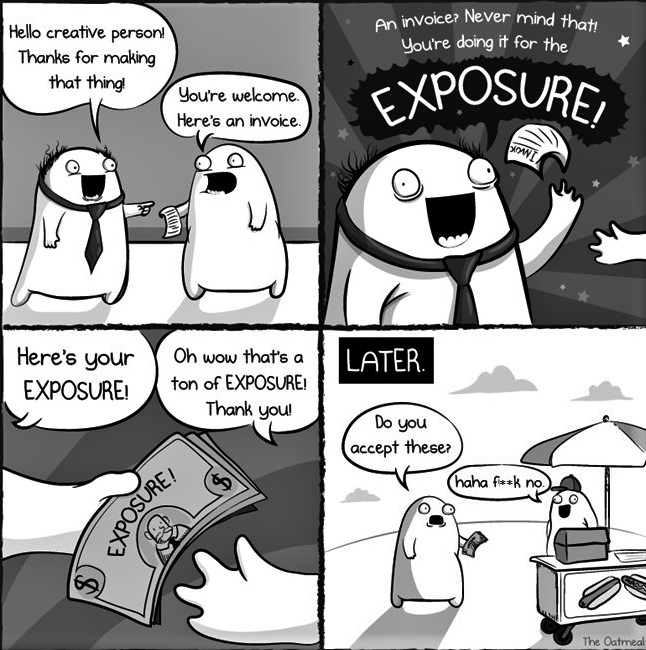
Ah yes, the exposure.
There’s plenty of advice out there about how to avoid the risk of getting cornered by a client/potential client who offers you loads of business exposure instead of payment. All excellent, but none deals with the back story, the context for your situation. Only you know your own backstory, and it can take a while to uncover that of your duplicitous counterpart, although red flags usually appear early. I’m sharing a recent experience and some suggestions for when the inevitable happens.
As it does to us all.
I’d spent two years building expertise and a profile on the risks small and medium enterprises (SMEs) run on being exposed to modern slavery in their operations and supply chains. SMEs are the biggest supplier to Australia’s corporates and these, in turn, are now legally obliged to act on slavery in their own systems if they turn over $100 million plus annually. That means (let’s say) X bespoke coffee supplier to Y AXS-listed company runs the risk of losing contracts, reputation and financial loss if their corporate partner uncovers slavery in their funky, on-message supplier’s system. Especially if the public gets wind of it and gets it out on social media.
I knew that getting the message out to this enormous, disparate sector would be like herding cats. The best strategy, I decided, would be to develop a working relationship with industry peak bodies. These could funnel information and support to members invested in best practice or at least in keeping their reputation and contracts intact.
The timing was great. I was ahead of the eight-ball. Federal modern slavery legislation was in progress. I could keep them informed on progress and then propose to deliver something concrete once the Act was passed.
I contacted two such bodies, one through an introduction to the CEO and the other, through a cold-call email to their national business development manager. For the latter, I made the judgement call not to try through the national manager or state managers.
Keep in mind that I am one tiny voice amidst an ocean of other, powerful anti-slavery organisations like Walk Free Foundation or the Sydney Catholic Archdiocese. But mine has been the only voice in Australia to focus on the SME white elephant in the business sector room. SMEs were – are – unaware and unprepared.
From the first body, and over the course of months of follow-up emails, I received no reply. Never mind that on the most basic level it was discourteous to my (well known and highly respected in the business community) contact who provided the introduction, but there it was. A wall of silence.
From the second, I received a positive response. The manager (let’s call them ‘Alex’) expressed their personal concern about modern slavery and appreciated that I’d reached out. We connected on LinkedIn and I kept Alex updated on the passage of legislation.
Australia’s Modern Slavery Act passed on 30 November last year. I emailed the news to both sources. Alex immediately emailed back, full of enthusiasm for this historic and consequential event:
Great news!!!
Thank you so much for keeping me up to date Anna.
Is there any timeframe within which businesses need to comply? Is there any assistance / guides to help businesses understand what is happening in their supply chain?
If you have time it would be great to catch up for a coffee – my shout!
Alex.
I emailed Alex back.
The Act gets activated on 1 January 2019 and businesses that must/choose to report on slavery must have their first report in by June 30 2020.
There’s a lot of resources. But – this is a big ‘but’ for your members – resources are overwhelmingly not fit-for-purpose or scaled to time-poor and resource-limited businesses. It’s also hard to know where to find what.
This is why I’m investigating what guidance would be practicable and I’m very keen to chat about this with you.
Over a follow-up phone call, Alex was complimentary.
‘I really appreciate you’ve kept me up to date all this time. I was waiting for the Act to pass before doing anything concrete’.
‘‘I know you get intel on this kind of thing from your Canberra networks’, I said. ‘But I thought it was important to share’.
‘No,’ said Alex. ‘We don’t have those kinds of contacts. There’s lots we’re not on top of; we just don’t have the resources. We rely on consultants like you who take the time to let us know’.
I’ve always followed the Thackeray principle that ‘an acorn costs nothing, but it may sprout a prodigious bit of timber’.
In the new year, we met and talked over coffee and pastries about an introductory webinar to their members. We got on like a house on fire, and shared common experience in professional upskilling delivery.
As I’d mentioned to Alex, most resource material on modern slavery is overlong, inappropriately bureaucratic or academic in style. And it’s hard to know what to select. With ‘fit for purpose’ at front of mind, I’d developed a simple, elegant matrix to help businesses brainstorm and map their activities against the seven business requirements of the Modern Slavery Act.
I showed Alex an outline of both pieces of work and suggested they could follow up the webinar with a workshop at their national conference later in the year, showing their leadership credentials. One would segue nicely into the other and work in perfectly with the roll-out of the Modern Slavery Act. Corporate members could use this as a basis to start working on their reporting requirements.
We set a tentative date to flesh out a webinar, contingent on receiving approval from the national manager to run one.
The permission came through. We confirmed our next meeting and I emailed Alex preliminary marketing information.
As a courtesy, I added details of a business dynasty expert – a former colleague – whom I thought they’d be interested in as a potential speaker at their national conference; and whose book they might add to their library. I’ve always followed the Thackeray principle that ‘an acorn costs nothing, but it may sprout a prodigious bit of timber’.
Back again at the company office, laptops and whiteboards at the ready, nothing had yet been said about payment. I suggested we first establish our expectations of the terms of this work.
‘I know you have a consultants register for training and workshops, so I wanted to make sure I followed the right process to join the register’, I added.
Alex seemed momentarily taken aback but continued smoothly.
‘Yes, so, we don’t pay you for the webinar’.
Oh.
‘Okay. Could you explain this a little further’?
‘We’re doing this as a free service to our members’, Alex said.
How does ‘free service to your members’ translate to ‘non-payment of your service provider?’, I wondered. Perhaps I didn’t count as one? If not, what was I, exactly?
‘We just recently had another consultant do a free half-hour webinar on single touch payroll’, Alex continued. ‘This is how we do it when we get a subject matter expert like you to deliver on their area of expertise’.
Right, so there’s a pattern here. I’m not the first. And it looks as though you’ve proceeded on the assumption I’m not going to ask.
Return on investment, Anna. Return on investment.
‘Okay. I’d like to discuss with you what my return will be for the time I put into delivering this free service’.
‘Well, I’ll be promoting you madly during the webinar’, Alex said. ‘And your business gets promoted when we send out the recording to our members’.
Promoting me madly?!?? Oh yes. The ‘exposure’.
I reflected again. I was cornered.
Try and extract what you can from this.
‘I expect to use this in my own marketing. I take it I can promote this as a collaboration with you’
‘Yes, absolutely’, Alex said.
‘Do I get access to the recording so I can use it with my own networks? And I assume that because I’m collaborating with you, my business logo and contact details will be on the recording and handout if I want to promote it on social media’.
‘Yes, that’s right’.
This’, I silently told myself, ‘is going to be an uber-short collaboration. You’ll get the experience, you’ll have the marketing. Take it, do it, then run’.
‘Okay. I accept this’, I said finally.
Alex then called the company administrator to lock in the date and we proceeded to flesh out some workshop points.
While this was going on, my computer battery of course died. I cursed it – and myself – for how unprofessional I must look, without the cable on hand to recharge it and relying on my notebook and pen.
Yep, I was already beating up on myself, when even the UK Prime Minister, with all the backup the British taxpayer could provide, could fall foul of a badly attached sign at a party conference.

I went back to my office and immediately got on to putting in writing what we’d agreed to and emailing this with follow-up marketing material. At least no-one could fault my impeccable reliability.
A week went by. No reply.
I rang the following week.
‘Hi Alex, it’s Anna from InterMondo here’.
‘Oh hi Anna! How are you going?’
‘Really well, thanks, Alex. I’m just calling to follow up the email I sent you with the marketing material you needed for the modern slavery webinar. Did you get a chance to read it? I’m keen to start preparing’.
‘Ah yes. Well, I’m not sure how we’re going to go with numbers (Isn’t it a bit soon to be thinking about that? We have a month and a half to go). ‘And I’ll need to get your marketing material so I know where we’re going with this.’
‘I sent you all the marketing material you requested last week’.
‘Great! Okay, I’ll have a look at it and get right back to you’.
I knew the writing was on the wall. Still, I waited another week.
On the following week I emailed Alex an excruciatingly carefully prepared email It was leached of every droplet of fury and crushing disappointment quivering in my very bones:
Hi Alex,
I haven’t heard back from you on the slavery legislation webinar, so I’m assuming there’s been a change of plan and it’s not going ahead.
Let me know if I can be of assistance in the future!
Cheers,
Anna.
That was in the beginning of February this year. Of course, I never heard back, on that or anything else.
It’s especially unfortunate because I believe Alex was a genuinely good-hearted person whose concerns about modern slavery were sincere. But clearly there was an institutional mindset and pattern of behaviours set at the top which influenced Alex’s actions. And of course, impacted my business and me.
This didn’t speak well for the mindset and behaviours of the organisation’s leadership team on worker exploitation. It indicated poor sector leadership. The fish rots from the head.
I began this blog by saying that this wasn’t a dilemma-solution blog. I’ve shared this experience to illustrate how, even when you’re carefully prepared, you can get blindsided.
Fortunately, this happened before I’d begun preparing for the webinar.
But this wasn’t a clear-cut case of getting out early.
As with many others, I’d already expended time (a year) and money researching, consulting, seeking advice, crafting emails and telephone scripts, developing fit-for-purpose draft material and all the activity and mind-space that goes into developing a single business relationship before it’s even begun.
As a sole operator, I did all of this myself. I don’t begrudge it. It all extended my skills and expertise.
But when it comes to the very problematic issue of slavery and other forms of extreme exploitation where businesses’ first port of call (if any) is their industry body, such organisations are not a dime a dozen.
I couldn’t (as experts might advise) go to the next organisation.
There is no ‘pool’ as such to choose from.
In the context of exploitation, it was grimly ironic that this organisation was showing form – to me, of all people.
From the first moment I contemplated reaching out to these peak bodies on modern slavery, I was perfectly aware of the reasons that might make them reluctant to engage. Among them, extreme risk aversion and fear of exposure. And simple professional discourtesy, mixed with that fear.
I was prepared for a long, careful journey. But this experienced changed things, and I had to protect my own business and myself. While courteously leaving the door open, it was not the time to force an entry.
It’s an understatement to say that this didn’t speak well for the mindset and behaviours of the organisation’s leadership team on worker exploitation. It flagged poor sector leadership. The fish rots from the head.
It also says volumes about the long, long journey we’re on to get businesses on board about modern slavery and that slippery spectrum of worker exploitation. You name it:
- Corporates at the end of a long line of exploitation, from slavery in their supply chain to wage theft, free intern labour and underpayment/non-payment of contractors.
- Family businesses, large and small, that cynically exploit shared ethnic identity and relationships of trust to enslave people who are desperate for work, to gain a foothold into their chosen career or choose cash in hand to avoid the backpacker tax and maximise their working holiday.
- Franchisees that are exploited by the mother company and make the choice to underpay their staff to keep their business afloat.
If this happens to you – whatever your position but especially if you’re a small or microbusiness – my advice is:
- Follow your instincts and get out of the relationship (or from pursuing it) as quickly and gracefully as you can without burning your bridges or tarnishing your professionalism.
- Get back on your horse as quickly as you can.
- Be honest about your own actions and learn from the experience.
- Understand your own and (as best you can, your counterpart’s) context. It will help you avoid and manage the risk. It will also help you long term with your business relationships, because you’ll come from a position of understanding and appreciation.
- Trawl as many of those free-advice blogs as you can, for steps to follow and even scripts to write. I’m a professional writer but I find these scripts really helpful.
Finally, find a way to be kind to yourself. You’ll suffer a blow to your self-esteem, as well as a business setback.
And remember: this happens to the most experienced professionals. How you recover and move on is just as important to your risk management as all that preparation beforehand.
Bad stuff happens.
Anna Ridgway helps people & business adjust how they communicate across cultures and with culturally diverse workforces to better manage their business relationships. Anna also specialises on the role of small and family businesses in contemporary slavery.


